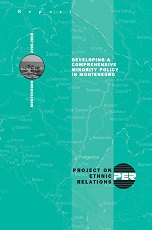Developing a Comprehensive Minority Policy in Montenegro
Developing a Comprehensive Minority Policy in Montenegro
Author(s): Livia Plaks, Alex Grigor'ev
Subject(s): Inter-Ethnic Relations, Ethnic Minorities Studies
Published by: PER Project on Ethnic Relations
Keywords: interethnic relations in Montenegro; Minority legislation; minorities in the constitution; minorities in media;
Summary/Abstract: Montenegro remained deficient in its minority policy legislation. The country’s first Minority Law remained stagnant in draft form despite the comments and encouragement of outside reviewers such as the OSCE High Commissioner for National Minorities and the Venice Commission of the Council of Europe. The problem was a lack of political consensus on several contentious points, and an inability to break the political stalemate and move forward. To address the specific issue of the political stalemate over the Minority Law as well as Montenegro’s general deficiency in minority policy legislation, in July 2005, with funding from the Global Opportunities Fund of the British Foreign and Commonwealth Office, PER launched a three-year initiative devoted to helping Montenegro develop and strengthen its state policies toward ethnic minorities, and in the process galvanize the authorities to show more political will in helping minorities in the country. Success was achieved early on in the project. In May 2006, Montenegro finally adopted the Minority Law and opened a new chapter in the history of majority-minority relations in Montenegro. But the Montenegrin path to minority accommodation was not without its setbacks. In July 2006, two key provisions of the Minority Law were declared unconstitutional by the Montenegrin Constitutional Court. The rejection of these provisions, which guaranteed seats in parliament and local assemblies for representatives of ethnic minorities, was perceived as a let-down by many minority leaders and continues to be an increasing source of tension between them and the majority. Mutually beneficial majority-minority relations have been the core of Montenegro’s successful model of interethnic accord. Damage to these relations will be the destabilizing factor in this multi-ethnic country.
Series: PER Reports
- Page Count: 28
- Publication Year: 2008
- Language: English
- Content File-PDF

